It’ll be all Wright in the flight.
This week’s invention theme has been Wilbur and Orville Wright’s brainchild: the aeroplane! We’ve enjoyed some science this week all about flight.
We started by making some paper aeroplanes. Plane 1 was the control, Plane 2 had one wing flap and Plane 3 had both flaps on its wings. We wanted to measure how far each plane travelled across the classroom.
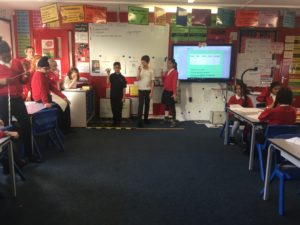
In our groups, we each had roles and had to work cooperatively.
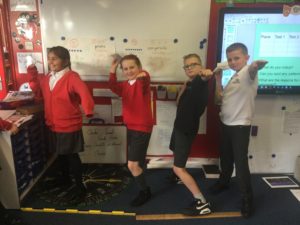
It was important to keep certain variables the same in order for it to be a fair test. We needed to know if it was the wing flaps affecting the distance travelled and not something else.
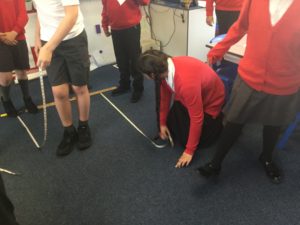
Tape measures were used in order to record each throw. We threw each plane three times to get an average distance.

We generally noticed that Plane 1 flew the furthest. Plane 2 always seemed to take a left hand curve and Plane 3 sometimes did a loop in the air. This led to our discussion about air resistance. The particles in the air were being blocked by the wing flaps, stopping the plane from cutting through the air and travelling as easily.
Imagine you have your hand out of the car window. What happens if you hold your palm up towards the sky? What happens if you hold your hand so the palm is facing the way you’re going? That is air resistance in action!
Our discussion led us to the following conclusion:
The greater the air resistance, the shorter the distance travelled.
Living and Learning: Anti bullying assembly
Thank you to everyone who came to Year 6’s class assembly. We focused on bullying: what it is; how to stop it; and how to make a choice not to bully.
Our favourite parts of our assembly were when we talked about what we are proud of. Here are a few for those of you who couldn’t make it yesterday.
Lewis: I am of colour and I am proud.
Martha: I like football and I am proud.
Ethan: I am small and I am proud.
Nicky: I am Sikh and I am proud.
We also wrote ‘kindness’ statements about each other:
Dylan, you are kind, selfless and inspiring. You are one in a million.
PE with Leeds Beckett
Year 5 welcomed visitors from Leeds Beckett for one of two weekly PE sessions. Like last week, it was high energy and lots of fun!
Our two favourite activities this week were noughts and crosses…

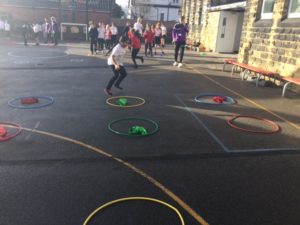
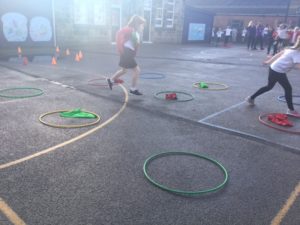
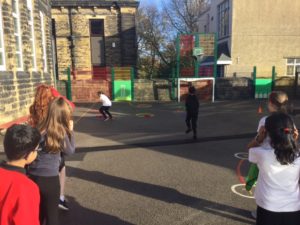

… and rock paper scissors! Two classic games mixed with a PE twist!
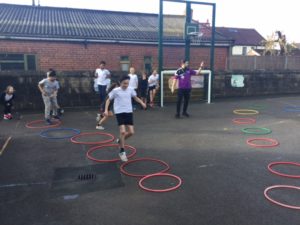
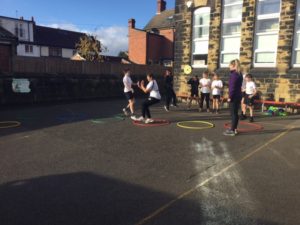
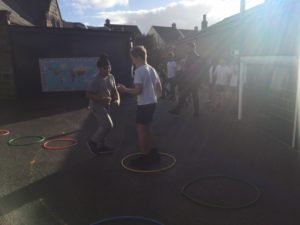
This half term, we’re focusing on moving in different ways, so this ticked all the boxes!
Time travellers trip tomorrow
Tomorrow afternoon, Year 1 are visiting Herd Farm for a Forest School Time Travellers experience based around our current big topic.
Here are a few reminders for the trip.
- The children should wear uniform as normal.
- We will be outdoors for the afternoon so please bring a warm, waterproof (although the forecast looks dry) coat, a hat and gloves.
- Bring wellies to wear for the trip. Children can change back into school shoes when we return.
- We will be eating our lunch before we go so your child needs to bring a packed lunch to school.
A few reminders
It’s going to be a busy day tomorrow!
In the morning, we are visiting Herd Farm for a Forest School Time Travellers experience based around our current big topic.
Here are a few reminders for the trip.
- The children should wear uniform as normal.
- We will be outdoors for the morning so please bring a warm, waterproof (although the forecast looks dry) coat, a hat and gloves.
- Bring wellies to wear for the trip. Children can change back into school shoes when we return.
- We will be back at school for lunch so no packed lunch is needed (unless your child normally has a packed lunch at school).
We’ve been checking the weather in class and fingers crossed it will stay dry. Ask your child how we found this out.
Please also ensure your child has their PE kit at school as in the afternoon we will be going to Allerton Grange for a PE session led by their Sports Leaders.
Odd socks day
We launched anti-bullying week today by taking part in Odd Socks Day.
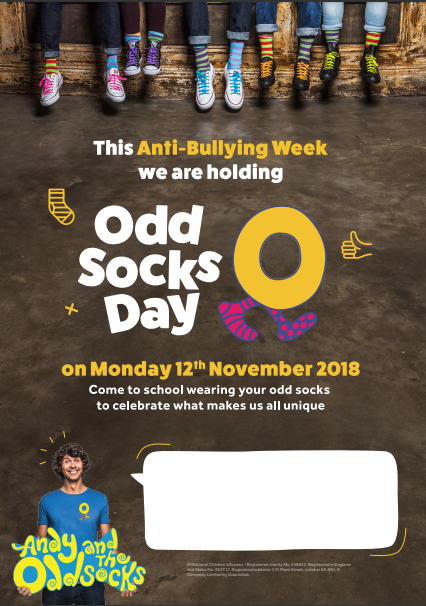
There were all kinds of sock colours and designs on show celebrating the fact that we are all different and unique. Thank you for supporting this.
Here’s some of the Year 2 selection.
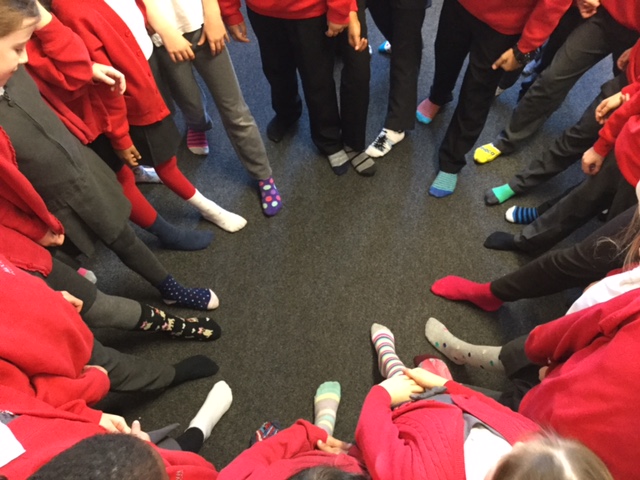
Sport at Allerton Grange High School
Last week, Year 4 walked to Allerton Grange High School for a sports session. We were all impressed with the organisation demonstrated by the older students. Year 4 were engaged right from the start thanks to the motivating energy from the leaders. It was great to see the high school students interacting with all the children and offering support to those who lack confidence in sport.
Thank you, Allerton Grange!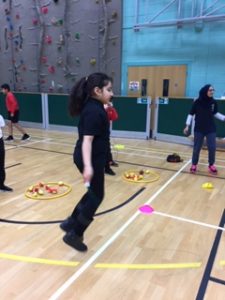
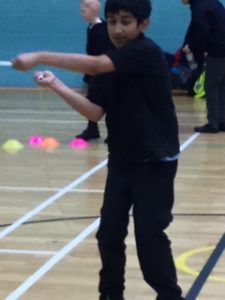
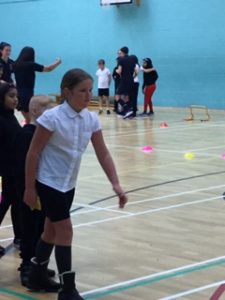
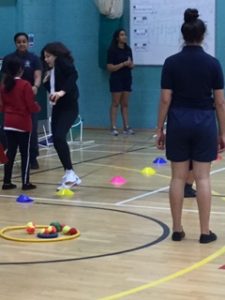
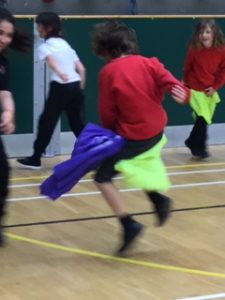
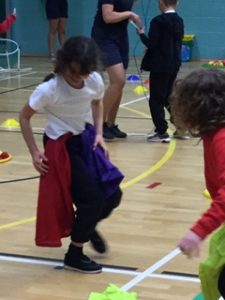
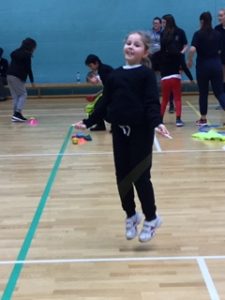
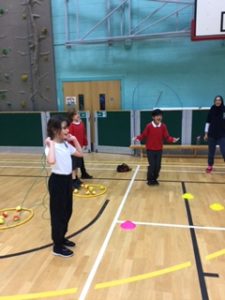
New kit awarded from Premier League Primary Stars
Following our application to the Premier League Primary Stars Kit and Equipment Scheme, we’ve heard our bid has been successful!
As a result, we’ll receive a new kit for school later in the year. This will be of great use for the football team and for other competitions.
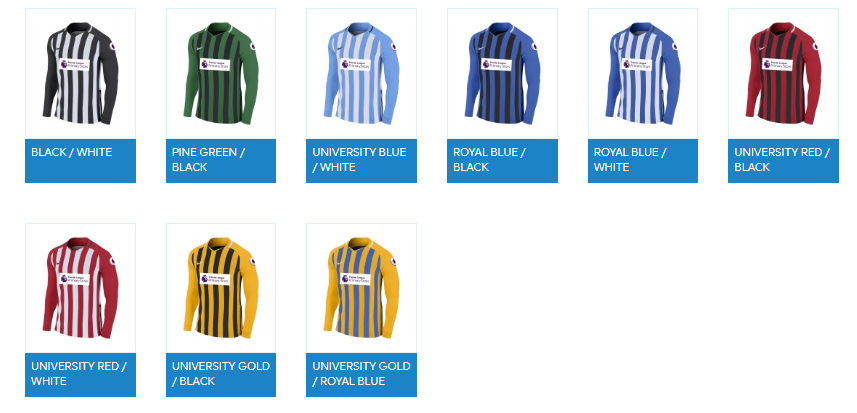
School Council, when they meet for the first time on Wednesday, will be discussing the possible team colours. The final choice will be made democratically: each school councillor will vote for their favourite.
Which would you choose?
Phonics
Thanks to everyone who came to the phonics mornings last week. We hope you found them useful. Please don’t hesitate to ask if you have any questions.
In Phase 2 of our phonics programme (Letters and Sounds), children will be taught the phonemes (sounds) for a number of letters (graphemes), which phoneme is represented by which grapheme and that a phoneme can be represented by more than one letter, for example, /ll/ as in b-e-ll. We use Jolly Phonics actions to help children remember these phonemes. Each week the children will bring a set of letters home to learn. Please practise these every day and keep them in their book bag for us to add to.
Your child will be taught how to pronounce the phonemes correctly to make blending easier.
Sounds should be sustained where possible (e.g. sss, fff, mmm) and, where this is not possible, ‘uh’ sounds after consonants should be reduced as far as possible. (e.g. try to avoid saying ‘buh’, ‘cuh’).
Set 1: s a t p
Set 2: i n m d
Set 3: g o c k
Set 4: ck (as in duck) e u r
Set 5: h b l
We will begin learning ‘tricky words’ this week which are words which are not phonetic. Please help your child to read these by recognition. The first tricky words are the and to which we will be sending home for the children to learn.
Now the children have knowledge of some letters and their sounds, try to encourage them to write words independently. This might just be the initial sound of a word. Let them write something important to them. This could be a label for their drawing, a list or a letter to a friend.
Allerton Grange sports leaders
Over the year, Year 2-Year 6 will visit Allerton Grange to take part in PE sessions organised by their sports leaders.
There are many benefits of these sessions:
- Allerton Grange sports leaders have the opportunity to practise and develop their skills with a class
- the sessions support our positive relationship with Allerton Grange
- our pupils visit a local high school
- the children get to enjoy a PE session in a different environment and see positive role models (the leaders)
- the sessions give a positive image to physical activity
- pupils reinforce their road safety knowledge as they walk to Allerton Grange